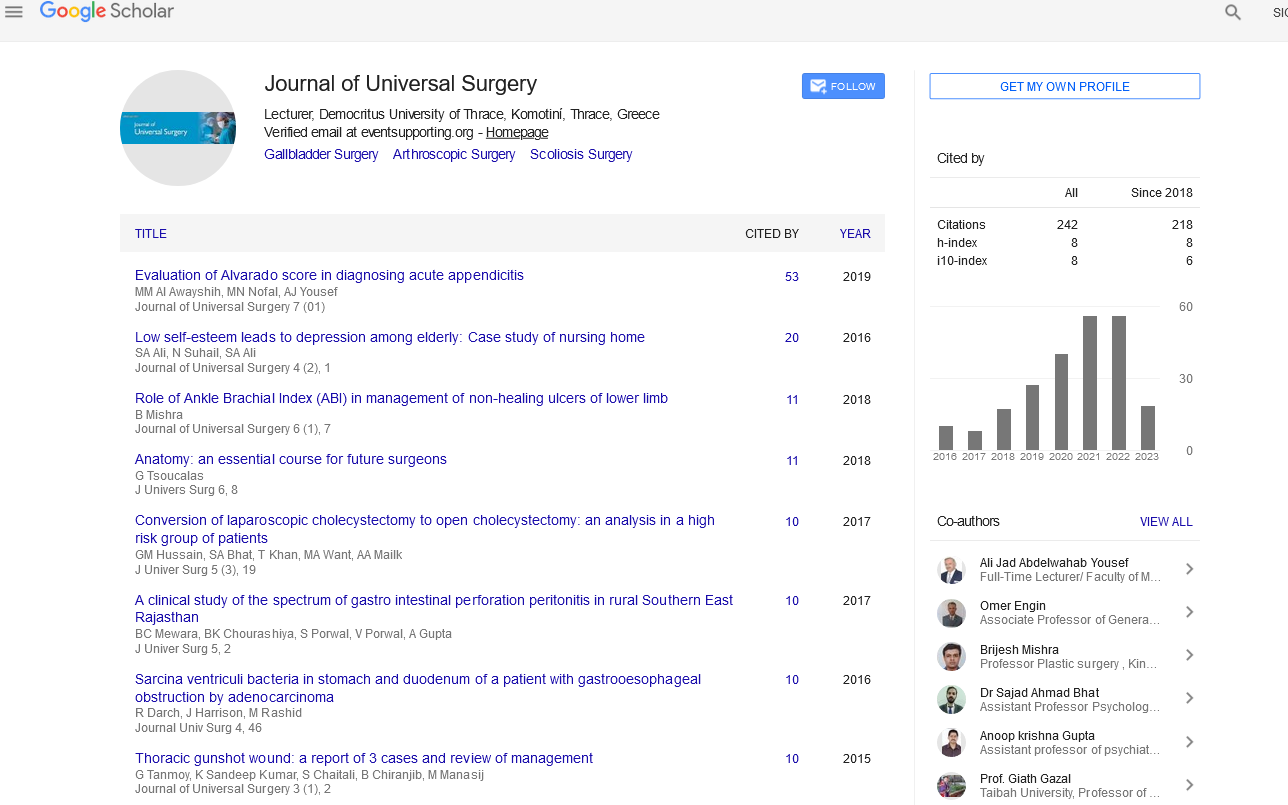Perspective - (2024) Volume 12, Issue 6
Complications of Sinus Surgery: Understanding the Risks and Management
Montrel Legolie*
Department of ENT, University of Putre, Putre, Chile
*Correspondence:
Montrel Legolie, Department of ENT, University of Putre, Putre,
Chile,
Email:
Received: 26-Nov-2024, Manuscript No. IPJUS-24-15371;
Editor assigned: 29-Nov-2024, Pre QC No. IPJUS-24-15371 (PQ);
Reviewed: 13-Dec-2024, QC No. IPJUS-24-15371;
Revised: 21-Dec-2024, Manuscript No. IPJUS-24-15371 (R);
Published:
29-Dec-2024
Introduction
Sinus surgery, often performed to address chronic sinusitis,
nasal polyps or structural abnormalities, is a commonly
undertaken procedure that significantly improves the quality of
life for many patients. However, like any surgical intervention,
sinus surgery carries potential risks and complications.
Awareness and understanding of these complications are
essential for both patients and healthcare providers to ensure
informed decisions and effective management.
Description
Common complications of sinus surgery
Bleeding (Epistaxis): Bleeding is one of the most frequently
encountered complications during or after sinus surgery. While
mild bleeding is common and typically resolves on its own,
significant bleeding may require intervention. Factors
contributing to bleeding include pre-existing conditions, use of
anticoagulants or unintentional injury to blood vessels during
the procedure.
Management: Application of nasal packing, cauterization or
in severe cases, surgical intervention may be necessary to
control bleedings.
Infection
Postoperative infections, though rare, can occur due to
bacterial colonization in the nasal passages or sinuses.
Symptoms such as fever, nasal discharge and increased pain
may indicate an infection.
Management: Prompt antibiotic therapy, nasal irrigation and
close monitoring are essential to address infections effectively.
Scarring and adhesions
The healing process may lead to scar tissue formation or
adhesions, which can obstruct the nasal passages. This
complication can compromise the surgery's intended outcome
and lead to recurrent symptoms.
Management: Secondary procedures such as nasal endoscopy
or revision surgery may be required to remove adhesions and
restore functionality.
Weight management and fitness
Excessive weight can strain the knee joint and prolong
recovery. Patients who are overweight may be advised to lose
some weight before surgery. Additionally, engaging in light
exercises or physical therapy can strengthen the muscles around
the knee, enhancing post-surgical recovery.
CSF Leak (Cerebrospinal Fluid Leak)
The proximity of the sinuses to the skull base increases the
risk of an accidental breach, causing cerebrospinal fluid leakage.
This rare but serious complication can lead to meningitis if not
promptly addressed.
Management: Identification through imaging, bed rest and in
some cases, surgical repair of the defect are necessary steps.
Vision problems
Sinuses are located near the eyes, and unintentional injury to
the orbit can lead to complications such as double vision, blurred
vision or even temporary blindness. Trauma to the optic nerve or
orbital contents is a rare but severe concern.
Management: Immediate ophthalmological assessment and
potential surgical repair are required to mitigate long-term
effects.
Reduced or loss of smell and taste
Temporary or permanent alteration in olfactory and
gustatory senses is another reported complication. The
surgery’s impact on the olfactory nerves or tissue inflammation
may contribute to these changes.
Management: Steroid therapy, nasal sprays, or olfactory
training may help improve symptoms over time.
Less common but serious complications
Anesthesia-related issues: Reactions to anesthesia can range
from minor side effects like nausea to severe complications such
as respiratory distress or cardiovascular events. Proper
preoperative assessment is crucial to minimize these risks:
Brain abscess or meningitis: Infections spreading from the
sinuses to the brain are rare but life-threatening complications.
Symptoms such as severe headaches, altered mental status, or
neurological deficits warrant immediate medical attention.
Management: Aggressive antibiotic therapy and neurosurgical
intervention may be required.
Tooth and jaw pain
In surgeries involving the maxillary sinuses, patients may
experience dental complications or jaw pain. Nerve irritation or
damage can lead to numbness or tingling in the upper teeth and
gums.
Management: Pain management strategies and consultation
with dental specialists are often beneficial.
Recurrence of symptoms
Despite successful surgery, some patients experience
recurrence of sinusitis or nasal polyps. Factors such as
incomplete removal of diseased tissue or ongoing allergic
inflammation may contribute.
Management: Long-term medical management, lifestyle
modifications or revision surgery may be needed to address
recurrent issues.
Risk factors for complications
Patient-related factors: Age, smoking, uncontrolled allergies
or pre-existing medical conditions such as diabetes increase the
risk of complications.
Surgical factors: The complexity of the procedure, surgeon
experience and the use of advanced technologies such as
image-guided navigation significantly influence outcomes.
Prevention and minimization of risks
Preoperative planning: Comprehensive imaging studies and
careful assessment of the patient's medical history help
identify potential challenges and reduce intraoperative risks.
Advanced surgical techniques
The use of minimally invasive tools and endoscopic
techniques, combined with intraoperative imaging, enhances
precision and minimizes tissue damage.
Patient education
Educating patients about postoperative care, including saline
irrigation, avoiding strenuous activities, and recognizing warning
signs of complications, plays a vital role in recovery.
Regular follow-up
Scheduled follow-up visits ensure early detection and
management of complications, thereby improving long-term
outcomes.
Conclusion
Sinus surgery can be life-changing for individuals suffering
from chronic sinus issues, but it is not without potential risks. A
thorough understanding of complications and their
management is critical for optimizing surgical outcomes.
Collaborative efforts between patients and healthcare providers,
supported by advancements in surgical technology and
postoperative care, are essential in minimizing complications
and enhancing the benefits of sinus surgery.
Citation: Legolie M (2024) Complications of Sinus Surgery: Understanding the Risks and Management. J Univ Surg Vol.12 No.6: 054.





